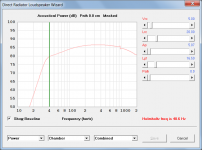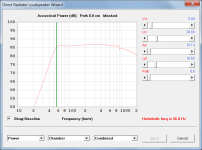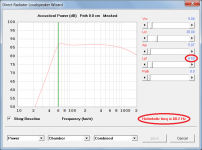In a QB3 alignment cooked up by WINISD for a 4 inch driver, the alignment calls for box volume equal to 4.42 liters, a tuning frequency of 65.6 Hz (Fs = 60 Hz), a vent diameter of 10.2 cm, and length of the vent is blank.
Based on calculations that I did for this driver in a vented alignment, the fact that vent length is blank in the alignment by WINISD I would think means that the corresponding vent length is very short and thus is not given.
Does this mean that in building the box that the system will work correctly so long as the vent length is very small, say 3/4 inch or less, or must the vent length be smaller than that?
Based on calculations that I did for this driver in a vented alignment, the fact that vent length is blank in the alignment by WINISD I would think means that the corresponding vent length is very short and thus is not given.
Does this mean that in building the box that the system will work correctly so long as the vent length is very small, say 3/4 inch or less, or must the vent length be smaller than that?
Something is very, very wrong! With such a small box volume, relatively low tuning frequency, and a large vent diameter, vent length should be over 1 yard!
Maybe program assumes that vent have to fit inside net volume of the box. That's quite difficult for 10.2x121 cm vent if available volume is limited to 4.42 liters. 10.2 vent is overshoot for 4" driver anyway so this would not be serious issue.
Something is very, very wrong! With such a small box volume, relatively low tuning frequency, and a large vent diameter, vent length should be over 1 yard!
Yes, I made an error of math in calculating vent length with a formula from Dickason's Loudspeaker Cookbook. Fixing the error, I calculated 120.65 cm for the vent length.
Also WINISD is giving a vent length, but in grayish or faded type, that is, much lighter than for example the tuning frequency. Does anyone know what showing the vent length in lighter type means in the program?
Thanks,
Pete
small increase of Qts does the trick
If Qts of the driver is increased from it's normal Qts of 0.38 to 0.47 by connecting a small resistor in series with it, then dimensions of the vent become much more reasonable. This also results in Vb equal to double Vas which is not excessively large, but large enough to accommodate a vent of several inches long.
A vent that I have on-hand measuring 1-5/8 inch diameter and 5 inches long is supposedly acceptable for the alignment that becomes Super QB3.
If anyone wants further details, let me know.
If Qts of the driver is increased from it's normal Qts of 0.38 to 0.47 by connecting a small resistor in series with it, then dimensions of the vent become much more reasonable. This also results in Vb equal to double Vas which is not excessively large, but large enough to accommodate a vent of several inches long.
A vent that I have on-hand measuring 1-5/8 inch diameter and 5 inches long is supposedly acceptable for the alignment that becomes Super QB3.
If anyone wants further details, let me know.
Also WINISD is giving a vent length, but in grayish or faded type, that is, much lighter than for example the tuning frequency. Does anyone know what showing the vent length in lighter type means in the program?
I wonder if WINSD has downloaded or is operating properly. I found a similar situation, entering different port values made no difference, in any event I opted for a vented (aperiodic) design, so port wasn't an issue. I'm a relative newcomer to all of this so it could easily be something I'm doing wrong.
I wonder if WINSD has downloaded or is operating properly. I found a similar situation, entering different port values made no difference, in any event I opted for a vented (aperiodic) design, so port wasn't an issue. I'm a relative newcomer to all of this so it could easily be something I'm doing wrong.
Thanks for the feedback. If both of us see the vent length in faded type, then probably that is the way that the program has been arranged to function, whatever the reason.
-Pete
I think this is just because the vent length exceeds the box dims.
Alternatively, it may be because the vent mach figure is over range.
Maybe try reducing port CSA until length becomes manageable?
Alternatively, it may be because the vent mach figure is over range.
Maybe try reducing port CSA until length becomes manageable?
No, I tried "building" a reasonable vented system with WINISD and the vent length was still given in the same light-colored (gray) type.I think this is just because the vent length exceeds the box dims.
Alternatively, it may be because the vent mach figure is over range.
Maybe try reducing port CSA until length becomes manageable?
What is the driver? Thiele/Hoge/Bullock -table alignments have certain limited range for Qts. Alignment fails if Qts is too low or high. WinISD might use some other method than simple interpolation from data table so limits might be difficult to notice without clear error message.
What is the driver? Thiele/Hoge/Bullock -table alignments have certain limited range for Qts. Alignment fails if Qts is too low or high. WinISD might use some other method than simple interpolation from data table so limits might be difficult to notice without clear error message.
The driver is MCM 55-1853, Newark Element 14. This is a 4 inch driver with
Fs= 60 Hz
Qts = 0.38
It you increase Qts to 0.47 by putting a resistor in series with the voice coil of the driver, then it can be configured SQB3 and the vent dimensions become reasonable. In testing this with WinISD, the vent length is still sort of faded, but still legible if you look closely.
Nothing odd there, the Qts is great for a vented box.
@ 5 liters & 60Hz, a 1" dia port would be ~6½" long
@ 5 liters & 60Hz, a 1" dia port would be ~6½" long
I don't find anything suspicious here. Lame outlooks of few text boxes is just style of read-only fields.
@ 5 liters & 60Hz, a 1" dia port would be ~6½" long
Attachment 1 shows the power response of a bass reflex loudspeaker having the above dimensions and a MCM 55-1853 driver. The fundamental resonance frequency of the system is closer to 40Hz than the desired target value of 60Hz. Attachment 2 shows the "flatter" power response obtained by simply doubling the port tube cross-sectional area Ap to move the fundamental frequency closer to the required 60Hz.
Attachments
Hmmm... Yep, thanks David. That would have been 1" dia and 6½ cm @ 5L and 60Hz, I didn't convert the length to inches. The pitfalls of doing things manually- I should be more careful before posting. Sorry!
That would have been 1" dia and 6½ cm @ 5L and 60Hz
Hi Tim,
That's better 🙂.
Kind regards,
David
Attachments
Nothing odd there, the Qts is great for a vented box.
@ 5 liters & 60Hz, a 1" dia port would be ~6½" long
The problem with the 1 inch dia. vent is that this is slightly less than the minimum diameter required to avoid power compression. A 2 inch diameter vent would be much better.
In your configuration, I think you mean that the vent would be about 6.5 cm long.
Nothing odd there, the Qts is great for a vented box.
@ 5 liters & 60Hz, a 1" dia port would be ~6½" long
Another problem that I have with your alignment is that in the books that I've read about the vented system, the different methods for arriving at box volume are based on Qts of the driver.
For example, looking at the alignment charts in Dickason's Cookbook, all of the different alignments (BB4, QB3, SC4) show box volume less than Vas where Qts equals 0.38. In your alignment, you set box volume equal to Vas.
^Table alignment is just one possible starting point you don't have to accept and build. Quite many extend frequency range by increasing volume and lowering HH resonance compared to table alignments. Also net volume losses due to vent and driver are commonly added to proposed volume by table alignment.
If you want to use tool aligning initially with traditional tables by Thiele/Hoge/Bullock, try e.g. VituixCAD. Here is your MCM with QB3 Ql=7.0. MCM is already in online database.
If you want to use tool aligning initially with traditional tables by Thiele/Hoge/Bullock, try e.g. VituixCAD. Here is your MCM with QB3 Ql=7.0. MCM is already in online database.
An externally hosted image should be here but it was not working when we last tested it.
Last edited:
In your configuration, I think you mean that the vent would be about 6.5 cm long.
Exactly. My bad, that length was calculated in cm and should have been converted to inches like the dia. before posting.
Another problem that I have with your alignment is that in the books that I've read about the vented system, the different methods for arriving at box volume are based on Qts of the driver.
That is a TBG™ alignment*. By definition, this alignment must be determined within a few seconds without software or charts, only eyeballs and noggins allowed. Facial grimacing is acceptible if it helps.
While the above is true, I wasn't suggesting an alignment. The numbers were just a quick manual check to see if any results may be unusual enough to explain your software troubles. Drivers with Qts near 0.4 tend to work well in enclosures near Vas size with Fb near Fs, so that's what I used.
BTW, it's nice to see someone actually reading for knowledge instead of just depending on software for answers.
* Tim's Best Guess™
- Home
- Design & Build
- Software Tools
- vent length not given in WINISD means?


